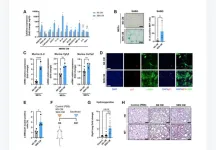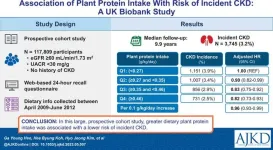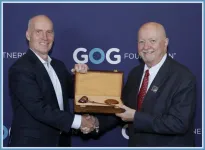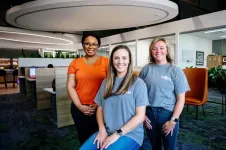(Press-News.org) A peer-reviewed study published in the Journal of Global Health analyzed data from more than 6,600 families with a child with a neurodevelopmental condition (NDC)—autism, attention-deficit/hyperactivity disorder, developmental language disorder, Down syndrome, Williams syndrome, and intellectual disability—from 70 countries, including the United States.
The study was led by Andrea Samson, associate professor of psychology at UniDistance Suisse and University of Fribourg, Switzerland, and Jo Van Herwegen, professor in developmental psychology and education at University College London’s Faculty of Education and Society.
According to co-author Michael Alessandri, clinical professor of psychology and pediatrics at the University of Miami College of Arts and Sciences, the study included seven U.S. collaborators and more than 500 U.S. families.
Participating parents completed an online questionnaire about anxiety levels and concerns during the first wave of the COVID-19 pandemic. The authors were interested in how parent and child anxiety developed over time, and aimed to quantify to what extent families and their children with NDCs were impacted by the COVID-19 pandemic and how their anxiety levels were mitigated or aggravated by country, family, and individual child factors such as their health or other individual differences or concerns. Because anxiety levels were likely affected by national demographic characteristics or government policy, the authors integrated data concerning how the pandemic evolved, government responses, and structural descriptors of countries from the European Centre for Disease Prevention and Control, the University of Oxford, and the CIA World Factbook.
“At the beginning of the pandemic we were worried about the many families with a child with NDC that were cut from their usual services and institutions such as specialized schools, day care services, therapists, clinicians, or medical care,” said Samson. “Since many of our research projects came to a sudden halt due to the pandemic, we dedicated our time to the creation of a survey in the first weeks of the pandemic, as well as building a network of more than 50 collaborators across the globe to help translate the questionnaire as well as to recruit families in their respective countries.”
The results show that at the beginning of the pandemic, anxiety increased significantly for parents and their children with an NDC as well as their typically developing sibling (if they had any), as reported by the parents.
“While anxiety decreased again for children to almost pre-pandemic levels, this was not the case for parents who seemed to be experiencing chronic increased stress,” Samson shared.
In the final analysis, parental concerns related to their and their children’s health, as well as their children’s lack of opportunity to get physically close to others due to anti-transmission measures (e.g., social distancing), were the best predictors of parental anxiety. This means that health-related worries and concerns about limited opportunities for social interactions increased parental anxiety. The lack of social contact seems to be one of the main worries for families with a child with an NDC, likely related to concerns about their social development.
Child anxiety was best explained by the “child factors,” such as their worries about COVID-19 or family conflict. The lack of routine was also identified as a significant contributor to all children’s anxiety.
While parental anxiety was not impacted by the type of NDC of their child, child anxiety was affected by the type of NDC and NDC-specific concerns.
For example, children with Williams syndrome had the highest levels of anxiety, and the anxiety of children with autism, ADHD, and Williams syndrome was explained by concerns about the loss of routine.
“This is in line with the elevated need of children with NDCs for consistency and routine in their daily lives,” said Van Herwegen. This finding indicates that the sudden changes to the daily structures of children with NDCs during the COVID-19 pandemic, due to the closure of schools and institutions, the discontinuation of mental health care services, as well as the necessary familial reorganization, greatly impacted these children and their families, independently of the country they lived in.
The researchers also noted that none of the government-level policy measures were significant factors predicting parental or child anxiety in the final models, which indicates that country-related contexts such as the public health system did not have a direct impact on anxiety.
“This finding presents a challenge in terms of understanding the implications of COVID-19, as no previous research has examined its effects on families and individuals with neurodevelopmental conditions through a global scale using cross-country models," reported lead author Vassilis Sideropoulos, a senior research technician with UCL’s Faculty of Education and Society. “The absence of a clear explanation for this finding highlights the complexity of the pandemic's impact on anxiety and the need for further exploration and investigation in this field.”
Van Herwegen underlines the importance of the study’s findings for future policy recommendations and for developing interventions and toolkits to help parents and children cope with future crises.
END
Multi-level international study explores anxiety, concerns of families with a child with a neurodevelopmental condition during the COVID-19 pandemic
2023-07-31
ELSE PRESS RELEASES FROM THIS DATE:
Human senescent fibroblasts cause lung fibrosis in mice
2023-07-31
“These observations support that accumulation of senescent cells may contribute to fibrotic lung disease [...]”
BUFFALO, NY- July 31, 2023 – A new research paper was published on the cover of Aging (listed by MEDLINE/PubMed as "Aging (Albany NY)" and "Aging-US" by Web of Science) Volume 15, Issue 14, entitled, “Human senescent fibroblasts trigger progressive lung fibrosis in mice.”
Cell senescence has recently emerged as a potentially relevant pathogenic mechanism in fibrosing interstitial lung diseases (f-ILDs), particularly in idiopathic pulmonary fibrosis. In a new study, researchers Fernanda Hernandez-Gonzalez, ...
Plant-based protein intake may reduce kidney disease risk
2023-07-31
Plant-based diets confer various health benefits, including lowering the risk of cardiovascular disease and certain cancers. However, the relationship between plant protein intake and the risk of chronic kidney disease (CKD) remains unclear. This study led by Ga Young Heo aimed to investigate the association between plant protein intake and the development of CKD. Using the UK biobank study data, the researchers found that participants with a higher plant protein intake had a lower risk of developing CKD. This finding suggests that a higher dietary intake of plant-based protein may be beneficial for kidney health and provide insight into ...
Researchers identify two new subtypes of HPV-associated head and neck cancers
2023-07-31
CHAPEL HILL, N.C. – Cases of human papillomavirus (HPV)-associated cancers of the head and neck, known as head and neck squamous cell carcinoma (HNSCC), are rapidly increasing throughout the United States. Unfortunately, relatively little is known about the factors that contribute to these tumors and what makes some tumors more aggressive and treatment-resistant than others.
To determine why some patients respond better to radiation therapy than others, researchers in UNC School of Medicine’s Department of Otolaryngology/Head and Neck ...
Endocrine Society and Matchbox Virtual Media announce joint venture
2023-07-31
WASHINGTON—The Endocrine Society and Matchbox Virtual Media are pleased to announce today that the organizations formed a joint venture that will bring exciting new opportunities for medical, healthcare, and scientific associations to better customize the experiences of their customers relative to producing meetings, organizing communities, and disseminating educational products.
The new joint venture will benefit from the Endocrine Society’s initial financial investments and its robust networking within the medical and scientific fields. Matchbox Virtual Media brings its proven platform, technologies, ...
Scientist who expands chemists’ tools joins The Wertheim UF Scripps Institute
2023-07-31
JUPITER, Fla. — A new scientist joining The Herbert Wertheim UF Scripps Institute for Biomedical Innovation & Technology invents creative and efficient ways to build complex, potentially useful molecules, studying their activity so that compounds found in nature may eventually become useful products, such as medications.
Synthetic chemist and associate professor Masayuki Wasa, Ph.D., joins the institute from Boston College, where he was an assistant professor of chemistry. Synthetic chemists specialize in assembling larger molecules from smaller parts, like a child assembling a Lego spaceship from a basket of oddly shaped pieces.
But the work is far from child’s ...
Thomas J. Herzog, MD takes office as The GOG Foundation, Inc. President
2023-07-31
At the NRG Oncology Summer Meeting on Thursday, July 20, 2023, at approximately 5:44pm EDT, Larry J. Copeland, MD passed the presidential gavel to Thomas J. Herzog, MD at The GOG Foundation, Inc. (GOG-F) Board of Directors meeting.
Dr. Herzog brings a comprehensive background in clinical trials, the integral business aspects and acumen to this important position. A practicing gynecologic oncologist and member of the Board of Directors of GOG-F, he has served as the Treasurer of GOG-F from 2014-2023 and prior ...
ACP issues updated guidance for colorectal cancer screening of asymptomatic adults
2023-07-31
Embargoed for release until 5:00 p.m. ET on Monday 31 July 2023
Annals of Internal Medicine Tip Sheet
@Annalsofim
Below please find summaries of new articles that will be published in the next issue of Annals of Internal Medicine. The summaries are not intended to substitute for the full articles as a source of information. This information is under strict embargo and by taking it into possession, media representatives are committing to the terms of the embargo not only on their own behalf, but also on behalf ...
Why you shouldn’t declaw tigers or other big cats
2023-07-31
Declawing house cats to keep them from scratching people and furniture is controversial – and even banned in some countries and areas in the U.S. – but the practice is not limited to house cats. In a new study, researchers looked at the effects of declawing on larger cat species and found that declawing disproportionately impacts their muscular capabilities as compared to their smaller brethren.
While it is illegal in the U.S. to surgically modify an exotic animal, declawing is still done on large cats like lions and tigers, often in an effort to allow cubs to more safely ...
Cutting-edge cancer research lab opens operations at Pepper Place
2023-07-31
BIRMINGHAM, Ala. – Birmingham’s Pepper Place has a striking new addition to its teeming farmers’ market and noted food offerings — a multimillion-dollar cancer research laboratory.
The lab is IN8bio’s new research and development facility in the Martin Biscuit Building at Pepper Place. This R&D space has about 6,000 square feet of wet lab space and around 4,000 square feet for offices, conferences and break areas. IN8bio is a biotechnology company focused on developing novel cellular therapies for cancer, with deep roots in cutting-edge cancer research developed at ...
New UArizona study links brain waves directly to memory
2023-07-31
Neurons produce rhythmic patterns of electrical activity in the brain. One of the unsettled questions in the field of neuroscience is what primarily drives these rhythmic signals, called oscillations. University of Arizona researchers have found that simply remembering events can trigger them, even more so than when people are experiencing the actual event.
The researchers, whose findings are published in the journal Neuron, specifically focused on what are known as theta oscillations, which emerge in the brain's hippocampus region during activities like exploration, navigation and sleep. The hippocampus plays ...





